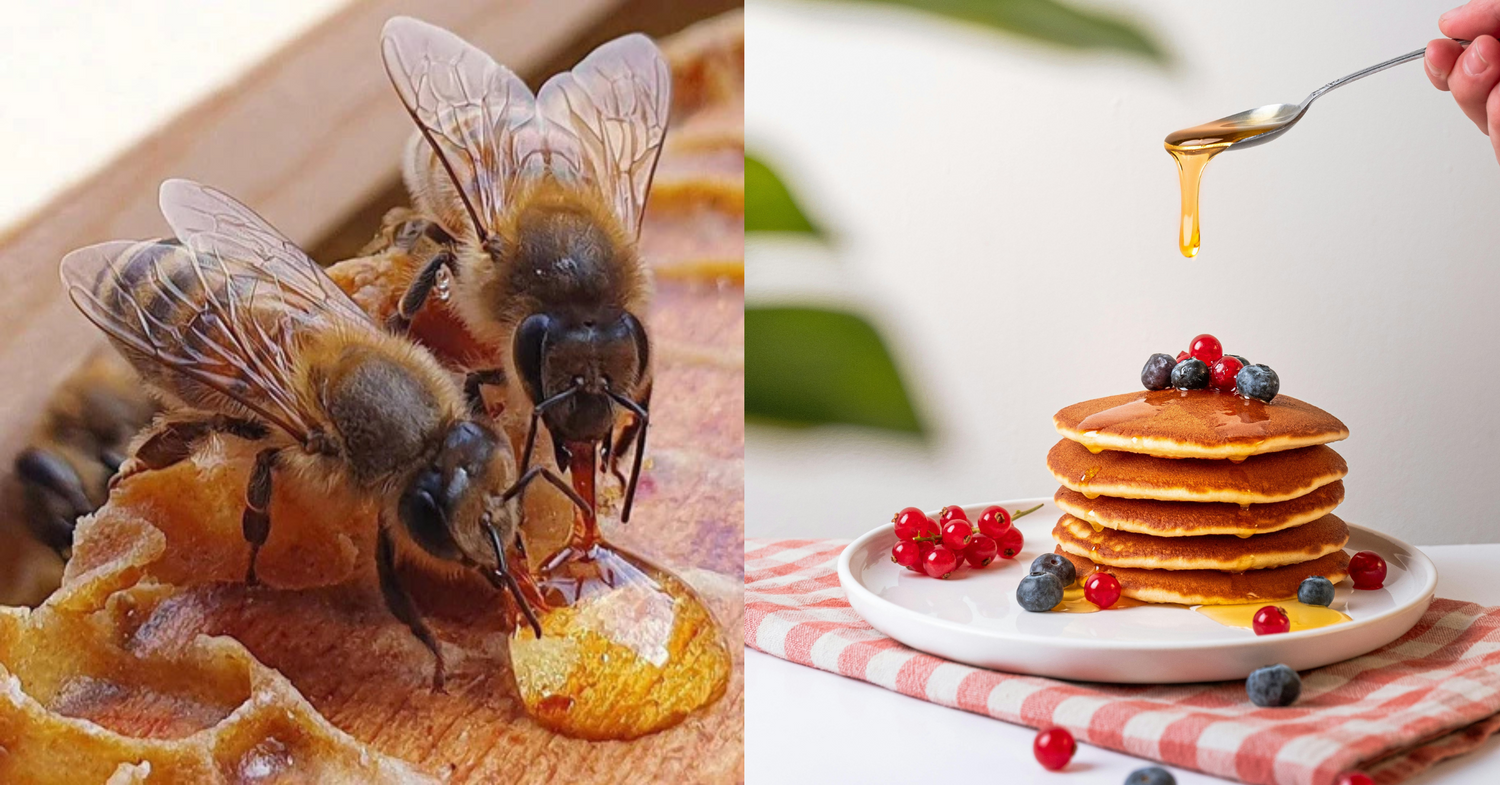When you think of honey, it’s probably the sweet, golden syrup you drizzle on pancakes or stir into tea. But did you know some types of honey are much more than just a kitchen staple?
Royal Black Honey is one such variety—a rare, nutrient-packed superfood that’s getting attention for its potential health benefits, including supporting cancer prevention.

Photo: Daily & Premium Royal Black honey
Let’s explore what makes Royal Black Honey so special and why it might be a great addition to your wellness routine.
What is Royal Black Honey?
Royal Black Honey is produced by Apis Dorsata bees that gather nectar from the Acacia Mahoni and Tualang tree flowers in West Java, Indonesia.

Photo: Apis Dorsata bee hives on a Mahoni tree in West Java, Indonesia
This dark, rich honey stands out not just for its taste but also for its powerful health properties, including antioxidants that help boost the immune system and promote overall well-being.

Photo: Harvested Royal Black honeycombs from Mahoni trees
How Can Royal Black Honey Help Prevent Cancer?
Royal Black Honey is loaded with nutrients and special compounds that can help protect your cells and keep your immune system strong—two key factors in cancer prevention. Here’s how this superfood works:
1. Packed with Antioxidants
Antioxidants are like the body’s defense squad, fighting off free radicals that can damage your cells and lead to cancer. Royal Black Honey is rich in phenolic acids and flavonoids, powerful antioxidants that help reduce oxidative stress—a known trigger for cancer.
Research: A study by Afrin et al. (2017) confirmed the presence of high phenolic and flavonoid content in dark honeys, attributing these to their potent antioxidant activity, which can prevent oxidative damage that leads to cancer.
2. Boosts Your Immune System
This honey isn’t just good for fighting off the occasional cold. It helps your body produce white blood cells, which are essential for attacking and destroying abnormal cells, including those that could turn into cancer.
Research: A 2013 study published in the Journal of Ethnopharmacology found that honey promotes immune modulation by increasing immune cell responses, which could contribute to the suppression of cancer cells.
3. Fights Inflammation
Chronic inflammation in the body can contribute to cancer growth. Luckily, Royal Black Honey contains anti-inflammatory compounds that help keep inflammation in check, lowering the risk of cancer.
Research: A review published in Oxidative Medicine and Cellular Longevity concluded that honey has significant anti-inflammatory effects, which can lower the risk of cancer.
4. Contains N-Acetyl Cysteine (NAC)
This unique honey also has N-acetyl cysteine (NAC), which helps repair damaged cells and protect healthy ones from mutating into cancer cells. NAC is a precursor to glutathione, one of the body’s most important antioxidants.
Research: A study published in Cancer Letters in 2015 indicated that NAC supplementation can inhibit cancer progression by enhancing DNA repair mechanisms and stabilizing free radicals.
5. May Suppress Tumor Growth Over Time
The nutrients in Royal Black Honey support your immune system in slowing down and even suppressing the growth of tumors. Regular consumption could make a big difference in keeping your body strong and resistant to cancer.
Research: Research published in BMC Complementary and Alternative Medicine in 2012 demonstrated that honey can induce apoptosis (programmed cell death) in cancer cells, reducing tumor growth.
More Than Just a Cancer Fighter: What Else is in Royal Black Honey?
This superfood is not just about cancer prevention—it’s also a nutritional booster. Here’s what you’ll get in every spoonful:
- Essential Minerals: Rich in zinc, iron, phosphate, and calcium to support everything from your immune system to bone health, making it especially useful if you have back pain.
- B-Vitamins: Contains B6, B12, riboflavin, and biotin, which are essential for energy, brain function, and red blood cell production.
- Alkaline Content: Its high alkaline content helps neutralise acids in your body, supporting better digestion and reducing inflammation.
How to Use Royal Black Honey
Don’t save this honey just for special occasions! You can make it part of your everyday wellness routine:
- Daily Supplement: Take a teaspoon in the morning for a natural energy boost and immune support.
- Smoothies or Tea: Add it to smoothies or herbal teas as a nutrient-packed sweetener.
- Topical Use: You can even apply it directly to cuts or wounds to help with healing, thanks to its antibacterial properties.

Photo: An example of adding Royal Black honey into a drink
It’s backed by science
Royal Black Honey is far more than just a natural sweetener. With its rich antioxidants, immune-boosting effects, and anti-inflammatory properties, it’s a powerful ally in supporting your health and potentially helping to prevent cancer. While more human research is needed, the science so far suggests that regular consumption could be a valuable addition to a healthy lifestyle.

So, if you’re looking for a natural, delicious way to support your body’s defenses, it might be time to give Royal Black Honey a try!
References
1. Afrin, S., Gasparrini, M., Forbes-Hernández, T. Y., Cianciosi, D., Reboredo-Rodriguez, P., Manna, P. P., ... & Battino, M. (2017). Antioxidant, antibacterial, and antiproliferative properties of manuka honey. Frontiers in microbiology, 8, 893.2. Al-Waili, N., Al-Ghamdi, A., Ansari, M. J., Barhum, K., & Al-Waili, H. (2013). Synergistic effects of honey and propolis toward drug multi-resistant Staphylococcus aureus, Escherichia coli and Candida albicans isolates in single and polymicrobial cultures. International Journal of Medical Sciences, 10(6), 549.
3. Samarghandian, S., Farkhondeh, T., & Samini, F. (2017). Honey and health: A review of recent clinical research. Pharmacognosy Research, 9(2), 121.
4. Oien, D. B., Garletts, L. A., Kim, C., & Bang, B. S. (2015). N-acetylcysteine inhibits cancer cell growth and proliferation in an osteosarcoma xenograft model. Cancer Letters, 368(1), 21-28.
5. Erejuwa, O. O., Sulaiman, S. A., Wahab, M. S. A., Sirajudeen, K. N. S., Salleh, M. S. M., & Gurtu, S. (2012). Honey supplementation in spontaneous hypertensive rats elicits antihypertensive effect via amelioration of renal oxidative stress. BMC Complementary and Alternative Medicine, 12(1), 1-12.






